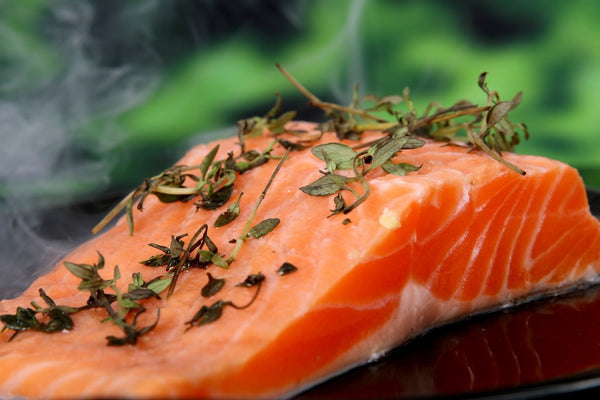8 Reasons to Add Salmon to Your Diet (Salmon Health Benefits)
Updated on Jun 26, 2023
Salmon has earned a reputation as one of the most nutritious foods you can put on your plate —and for good reason. This flavorful fish is packed with high-quality protein, healthy fats, and essential vitamins and minerals.
In this article, you’ll learn why salmon is considered good for you, the science-backed health benefits it offers, and how it can play a role in supporting everything from heart and brain function to bone and immune health.
Is Salmon Good for You?
Salmon can be a valuable part of a healthy diet because it’s rich in omega-3 fatty acids, lean protein, and essential nutrients like vitamin D, B vitamins, selenium, and potassium.
These nutrients support everything from heart and brain health to muscle repair, immunity, and inflammation control.
By eating salmon regularly — about two servings per week, as recommended in dietary guidelines — you can promote wellness and enjoy a wide range of specific health benefits, which we’ll explore below.
Salmon Health Benefits
Now that you know why salmon is considered such a nutrient powerhouse, let’s take a closer look at the specific ways it can support your health.
1. Promotes heart health
Salmon is one of the best dietary sources of omega-3 fatty acids, particularly EPA and DHA. These healthy fats help lower triglyceride levels, reduce blood pressure, and decrease your risk of heart disease.
For example, studies show that people who eat fatty fish like salmon at least twice a week may lower their chances of developing cardiovascular problems. Adding salmon to your diet can be a simple step toward keeping your heart strong.
2. Enhances brain function
Your brain thrives on omega-3s, and salmon provides them in abundance. These fats support memory, focus, and overall cognitive function. DHA, in particular, makes up a large part of the brain’s structure, which is why it’s so important for both growing children and aging adults.
Eating salmon regularly has been linked to slower cognitive decline in older adults, which shows how powerful food can be for long-term brain health.
3. Improves mental health
Beyond brain performance, salmon may also benefit your mood. Its omega-3 fatty acids are thought to help regulate neurotransmitters like serotonin and dopamine, which influence how you feel.
On top of that, salmon is rich in high-quality protein, which provides amino acids that your body uses to produce these same mood-related brain chemicals.
Some studies suggest that protein intake has also been linked to a reduction in depression and anxiety. For instance, a comforting salmon dinner may do more than satisfy your hunger — it could also help support emotional well-being.
4. Helps fight inflammation
Eating salmon regularly can play a key role in lowering inflammation in the body. This benefit comes mainly from its omega-3 fatty acids — EPA and DHA — which are known for their strong anti-inflammatory effects.
These healthy fats help reduce the production of inflammatory molecules, which can otherwise contribute to conditions like heart disease, arthritis, and diabetes.
Research supports this connection. People who eat salmon or take EPA and DHA supplements often experience reductions in C-reactive protein (CRP), a key marker of inflammation in the body.
Lower CRP levels mean less strain on your heart and blood vessels, as well as potential relief from inflammatory conditions such as joint stiffness.
5. Strengthens the immune system
Salmon, especially wild-caught varieties, is an excellent source of vitamin D — a nutrient that plays a critical role in keeping your immune system strong.
Vitamin D helps regulate how your body responds to infections by supporting the activity of immune cells. Without enough of it, your defenses may become weaker, leaving you more vulnerable to colds, flu, and other illnesses.
Wild salmon tends to have higher vitamin D levels than farmed salmon, making it a particularly powerful choice for immune support. Since many people don’t get enough sun exposure to naturally produce sufficient vitamin D, including salmon in your diet is a delicious way to help fill that gap.
Related: Wild Caught vs. Farm Raised Salmon
6. Aids in weight management
Salmon is filling yet relatively low in calories, which makes it a smart choice for weight management. The combination of protein and healthy fats helps you feel satisfied longer, reducing the urge to snack between meals.
For example, having grilled salmon with vegetables for lunch can provide steady energy and keep you from reaching for processed snacks later in the day.
7. Protects eye health
The same omega-3 fatty acids in salmon that support your brain and heart also play a role in maintaining eye health. They may help protect your vision as you age and support overall eye function.
Salmon also contains antioxidants, such as astaxanthin, which contribute to reducing eye strain and supporting long-term eye comfort. Including salmon in your diet is a simple way to give your eyes some extra care.
8. Contributes to stronger bones
Bone health often gets less attention than heart or brain health, yet it’s just as important for staying active and independent as you age. Vitamin D in salmon helps your body absorb calcium, the main mineral in bones.
Beyond vitamin D, the protein, phosphorus, and selenium content in salmon support the structure and density of your bones, which helps lower the risk of fractures and osteoporosis.
Summary
Salmon isn’t just tasty — it’s one of the healthiest foods you can eat. From heart and brain health to mood, immunity, and strong bones, this nutrient-packed fish supports you at every stage of life. Just two servings a week can make a real difference.
For the best in both nutrition and flavor, try Wild Sockeye or Wild King Salmon from Alaskan Salmon Company. Rich in omega-3s, vitamin D, and protein, these wild-caught varieties are sustainably sourced from Alaska’s pristine waters.







